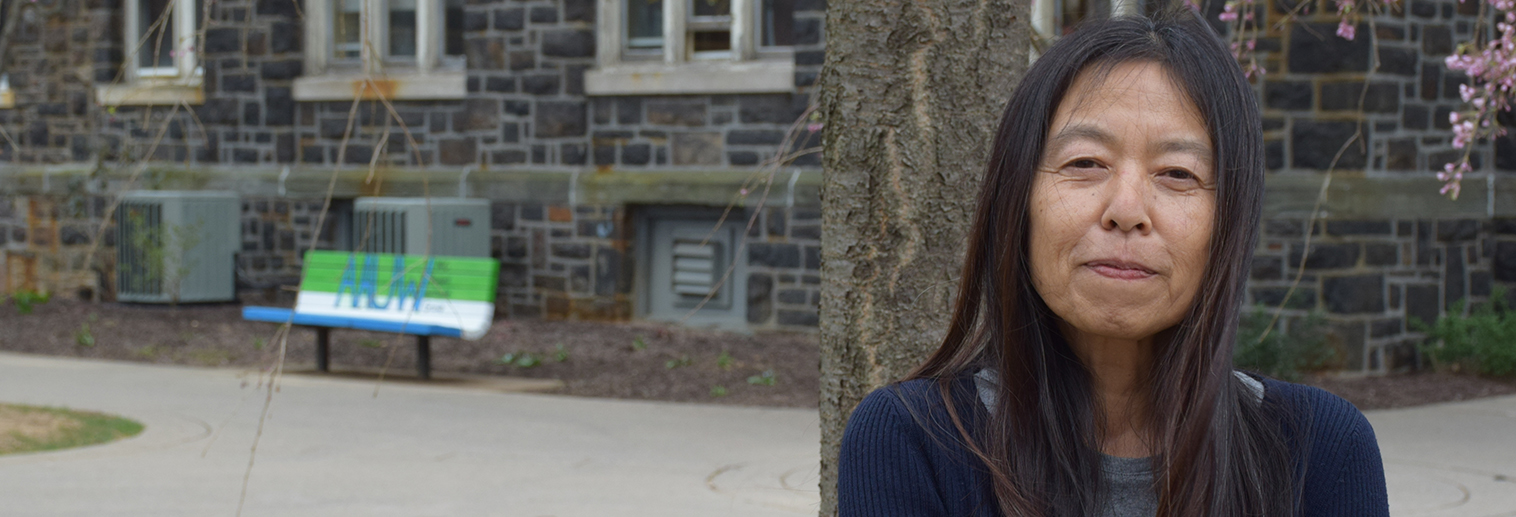Examining Change in China
Yayoi Kato, assistant professor of political science, shares her findings about changes in current Chinese policy at her March 17 faculty luncheon.
By Jonathan Clark ‘16
Yayoi Kato is a first-year assistant professor of political science who joins us after spending her last academic year as a visiting professor at Hamilton College in New York. Prior to that she taught Chinese politics, Japanese politics and Asian philosophies at the University of Southern California, her alma mater.
Kato presented her current research into China’s policy process in a talk titled “Bringing the Party Back in to China’s Policy Process: Ideology as a Framing Tool” to fellow colleagues at the Faculty Luncheon on March 17. Inside Moravian attended Kato’s presentation and followed up with her in her office in Comenius. Here, Kato’s insights.
InsideMoravian: Your presentation focused on China’s policy making. Would you briefly clarify what your research is trying to illustrate?
Yayoi Kato: My research is about the Communist Party's skills in adapting to a changing political environment. Compared to the period when Mao ruled, China’s policy-making process has been pluralized a great deal as political participation has expanded tremendously. So my research explores how the Communist Party has been adapting to this pluralization. I did policy debate analysis and found that the Party began to use socialist ideology as a political tool to control the policy process. Although socialist ideology’s influence is diminishing in China and it is hard to find true communists or Marxists in China these days, socialist ideology can still be used as an issue-framing and agenda-setting tool to manage the policy process, especially for mobilizing support for the Party’s agenda and building consensus in the policy community. This pragmatic use of socialist ideology is part of the Party’s adaptation efforts to the growing pluralization trend. The Communist Party has very good survival and adaptation skills. The Party no longer uses ideology as a tool for indoctrination or mass campaigns but as a strategic device to control policy making.
IM: Will you continue to pursue this research?
YK: Yes. I was granted a research stipend for this summer from the FDRC. I will visit a research site in Hong Kong and collect data for my second case study under the same project I discussed at the Luncheon. The first case study focuses on the policy debate in the 1990s but the second one focuses on the current debate.
IM: How did growing up in Japan shape your personal journey?
YK: Japan is a homogeneous society emphasizing conformity and social harmony. I felt it a little oppressive when I grew up. Individualism is often considered a form of selfishness. I wanted to explore more spiritual freedom and to be liberated from the social pressure I felt all the time in Japan. I came to the United States originally with the intention of getting a Master’s degree but ended up pursuing a Ph.D. After graduation, I wanted to stay in Los Angeles but there are not many liberal arts colleges there, which made it difficult for me to find a teaching position in Asian politics, so I decided to move to the East Coast.
IM: Having taught in both settings, what do you find to be the advantages of a liberal arts environment as opposed to a larger university?
YK: I used to teach at a big university but feel much more comfortable in a liberal arts college environment because I can get much closer to students. At a large university with big classes, it’s hard to engage with students. Liberal arts colleges, like Moravian, offer an environment where students can succeed if encouraged properly, and I am passionate about helping my students realize their fullest potential.
IM: What compelled you to want to teach?
YK: As a foreign-born instructor, I think my primary mission is to help students open their eyes to the outside world. In this age of globalization, we cannot afford to live without paying attention to the outside world. When I teach international politics and Asian politics, I always encourage students to get out of the “American mindset” and look at things from foreigners’ perspectives. How does China look at the United States? Do the Chinese look at the United States in the same way that you do? After engaging in discussions, I often see students’ views widened and open to new perspectives, which gives me great satisfaction.

